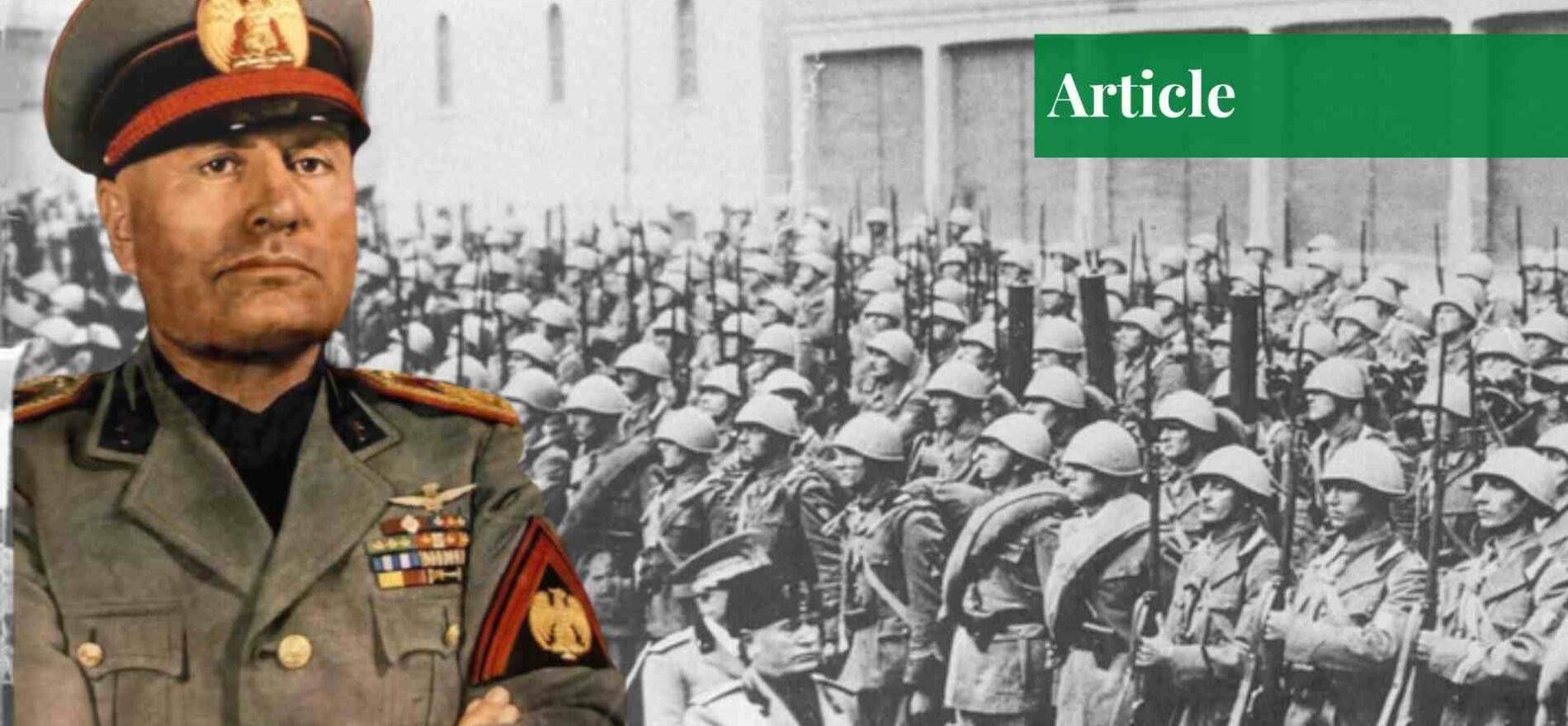Ms Alishbah Syed is pursuing her Bachelor's degree in International Relations from University of Peshawar.
Early Life And Influences
Benito Mussolini, the father of fascism, was born on July 29, 1883, in a small village named Predappio in the province of Forli, Italy. He grew up in a poor family which he took immense pride in during his political career as his ‘humble origins’ made him the ‘man of the people.’ He was the first child of the local blacksmith with a schoolteacher for a mother, but his parents gave him additional influences aside from their professions. Mussolini’s father was a part-time socialist journalist, while his mother was a devout catholic.
While his father took Mussolini to the pubs to be present among other fellow socialists, his mother took him to the masses. These dual influences led him to look up to Karl Marx and the Pope. At a young age, Mussolini was an aggressive, obstinate, and unruly child. Something Mussolini himself admitted by saying, “I was not a good boy. I was, I believe, unruly.” This led to a troubled childhood where he was expelled from two schools until he was admitted to his third school where he finally stuck around to finish his schooling. He completed his compulsory schooling at the age of seventeen with accomplishments in public speaking in addition to a bad school record.
Professional Life and the Allure of Socialism
Mussolini’s first job was ironically as a schoolteacher despite his bad school record, and unsurprisingly lost this job by violently arguing with others. Jobless without any future aside from a reputation of being a womanizer, he moved to Switzerland to do manual labor in 1902 to escape his hopeless situation and partially to escape compulsory military duty in Italy. Along with him, the influences of his father came as he joined a Marxist group and a trade union while having a ‘hobby’ of agitating political rallies.
Despite being deported countless times from Switzerland, he still came back in 1904 when he returned to Italy and had to tend to his compulsory military duty of two years. Mostly because military deserters now had the opportunity to be pardoned by servicing in the military. After his military duty ended in 1906, he returned back to teaching.
Despite being a part of the military service, Mussolini did not learn much about discipline. Eventually, his roots drew him to the same place as his father and mother. He did it through writing and editing for socialist newspapers along with rallies against democracy, the government, and the church. Mussolini was considered to be well-read, especially when you consider his writings.
Mussolini’s eventual break into fame was when he got arrested for 4 months in 1911 for participating in a riot against Italy’s war in Libya protesting against the imperialistic actions of Italy. His avid public speaking and later arrest brought him into the eyes of top socialist leaders and intellectuals of Italy who regarded him. It landed Mussolini as an editor of ‘Avanti’ in 1912, Italy’s national socialist newspaper where he fit like a glove. His inflammatory style of reporting attracted more readerships while Mussolini now had a national forum to speak out at. He became a well-known socialist journalist at the time, capturing accurately the proletariat’s feelings.
WWI and the Changing of Sides
Mussolini was firmly against Italy’s intervention in WWI. It was in line with how Mussolini was when Italy invaded Libya, but that changed a few months in. A mixture of unification of Italy with the working classes getting a chance out and the chance of social change in great powers drove Mussolini to completely support the war. He justified war as a means of revolutionary change and called it a ‘revolutionary war’, using Avanti as a forum to voice to call the young Italians to join the war.
It started a radical change within his views, ending his long-held belief in the class struggle and egalitarian concepts of socialism. His new attachment became to ultra-nationalism and patriotism with irredentism in the background. Mussolini founded the Il Popolo d’Italia (The People of Italy) newspaper which supported his interventionist views. It eventually culminated in the forming of a new political movement, the Fasci d’Azione Rivoluzionaria in 1914.
The Fascist party in 1914 was small, underdeveloped, and weak along with being greatly antagonized by the government and other socialists, something that gave fuel to Mussolini’s hatred towards them. Along with openly supporting Italy’s intervention, earning the interest and implicit support of France and Britain who wanted Italy to be on their side, Mussolini joined the military to fight in the war.
After Italy’s entry into WWI in July 1915, Mussolini followed in September. His military endeavors ended in February 1917 when he was accidentally injured by a motor bomb explosion.
The Father Of Fascism
Mussolini’s fascism had many ideological roots and foundations, but all those influences were underpinned by Mussolini’s opportunistic and Machiavellian way of politics. This especially came into fruition with Mussolini’s desire of recreating the Roman Empire and a concept of a ‘superior race’ similar to Nazism. Italy getting the short end of the stick in the Paris Peace Talks, the utter ridicule Mussolini’s party received when it lost in the election and the three years of political instability all ramped up the fascists and made them more power-hungry.

In May 1921, the fascists joined a coalition of right-winged parties named the ‘National Block’ which got Mussolini into the Italian government as a member of the chamber of deputies. In October 1922, Mussolini and his party, renamed to National Fascist Party, demanded a fascist government with a coup by marching to Rome. The king of Italy, King Victor Emmanuel III, handed over the power to Mussolini on account of Mussolini’s increased support in the public and military despite fears of a civil war.
At the age of 39, Mussolini became the Prime Minister and foreign minister simply through threats and bullying, and the totalitarian revolution of fascism began to show explicitly. This was because working in a democratic setting when the fascists were a minority in the government was not ideal for the power-hungry Mussolini. Upon assuming office, Mussolini set up a ‘Fascist Grand Council’ to reduce the acting power of the parliament.
In 1923, Acerbo Law was passed to make sure the Fascists won the elections in 1924. The socialist deputy, Giacomo Matteotti, was assassinated soon after requesting re-elections because of the overwhelming victory of the Fascists. Mussolini eventually dropped the pretense of democracy in 1925 when he admitted to being responsible for the Blackshirts’ violence, a fascist paramilitary group, and challenged his political opponents to try to remove him from office as Mussolini truly began his Fascist dictatorship.
Deep pervasive control over all media, a constant stream of propaganda, spies everywhere, and alternative political parties disbanded to make way for a one-party government and a façade of freedom to the public all culminated in Mussolini’s iron-fisted rule. Three instructions by Mussolini were drilled into the national consciousness, “Believe, Obey, Fight”. A quote by Mussolini has become immortalized, “All within the state, nothing outside the state, nothing against the state.”
The Wall Street crash of 1929 created economic chaos in Italy to which Mussolini responded with an invasion of Libya, Ethiopia, and Spain. With the devastating and brutal occupation of Mussolini’s Italy (killing an estimated 8% of Ethiopia’s population), the UN had acted by sanctioning Italy. This got Mussolini mad which led, in 1936, him walking into the influence of a fellow dictator, Hitler.
WWII: The Beginning of the End
Mussolini formed a ‘Pact of Steel’ (Rome-Berlin Axis) between Adolf Hitler and himself in 1939 assuring support to one another in the case of any war. Then a few months later, Germany invaded Poland. Mussolini tip-toed around completing his obligation of support to Hitler as Italy’s resources were stretched to the max due to the economic crisis and Ethiopian occupation. He would cite Hitler’s non-aggression agreement with the Soviet Union violating the provision of the ‘Pact of Steel’ as his no-show in the war.

Outwardly, Mussolini supported Hitler’s actions but in private he desired to join the Britain/France coalition. When things began to look in the Axis power’s favor, Mussolini entered the war against Britain and France in 1940 to make sure not to miss out on any spoils of war. He even went as far as to attack the British holding back in Africa. Italy performed poorly from the start with multiple defeats from North Africa, Egypt, Greece, and the Soviet Union.
By 1942, it became quite clear that Italy was a liability as Hitler had to constantly order forces to save them from the pickle they were in. The last straw was when the Allies touched down in Sicily in 1943, and Mussolini’s own government arrested Mussolini. It was a surprise to the ‘Ill Duce’ but with the current situation of complete and utter loss and chaos in Italy because of his failed opportunistic and greedy behavior, he was deposed by Italian King Victor Emmanuel III on 25th July 1943.
He was saved soon after by the German forces but Hitler saw a different man by now. The bold and charismatic Mussolini had degraded into the shell of a man he was before. Mussolini asked for an early political retirement, but Hitler wasn’t done with him yet. He was still of use to Hitler so Mussolini was installed as a puppet leader of the Italian Social Republic in northern Italy. The alliance between Mussolini and Hitler ultimately proved to be unsuccessful, as the Axis powers faced defeat from the combined forces of the Allied nations.
The Great Fall
On 25th April 1945, with the Allied troops nearing, Mussolini and his mistress Clara Petacci set out for Switzerland to escape to Spain by plane. Two days later, on 27th April, however, they were stopped and identified near the village of Dongo (Lake Como) by communist partisans. On 28th April 1945, Mussolini and Petacci were executed by a firing squad. Their bodies along with other Fascist members were taken to Piazzale Loreto, renamed “Piazza Quindici Martiri” (Fifteen Martyrs’ Square) in honor of fifteen Italian partisans recently executed there, in Milan.

They were publicly displayed, desecrated, and hung upside down in a gasoline station by a mob. Ultimately, Mussolini’s bullet-ridden corpse was taken to the city morgue and later buried in an unmarked grave in a Milan cemetery. However, his body was exhumed several times by anti-fascists until it was finally returned to his family’s crypt in Predappio in 1957. His death marked the end of his brutal regime and his dream of re-creating the Roman Empire; a symbol of the downfall of fascism.
If you want to submit your articles, research papers, and book reviews, please check the Submissions page.
The views and opinions expressed in this article/paper are the author’s own and do not necessarily reflect the editorial position of Paradigm Shift.


















